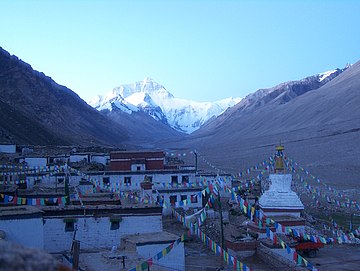Tibet Singing Experience
I'm standing outside the Rongbuk Monastery, the highest monastery in the world, in the shadow of Mt. Everest and other indescribably majestic peaks. It's dusk, it's cold and the only sound is the wind blowing across the snow and rocks. A yak breaks in with a bellow that sounds more like a squeal than a moo. In the distance a group of Tibetan men and women are returning from the fields below, their tools on their shoulders. As they draw closer, I hear the sound of their voices, and it's the most beautiful sound I've ever heard.
Maybe it's just the overall scene, maybe I'm lightheaded from the lack of oxygen, but I've never heard anything to which I can compare their song. It's not a sad, workers' song of woe, it's not a dreary religious dirge. It's a song of happiness and joy, and so magnificently beautiful. As they get closer, I can see that they're practically laughing as they sing. They've been at back-breaking work since before sunup this morning, yet they seem extremely happy. As they pass by, they greet me with big smiles and "tashidalek" (God be with you). Then they resume their singing and move on down the road.
In no way does the above even come close to adequately describing what it was really like that evening. The best audio and video equipment in the world couldn't capture it.


Rongbuk monastery was founded in 1902 by the Nyingmapa Lama (Ngawang Tenzin Norbu) in an area of meditation huts and caves that had been in use by communities of nuns since the 18th century. Nyingma ("ancient") is the oldest of the 4 major schools of Tibetan Buddhism, founded on the 1st translations of Buddhist scriptures from Sanskrit into Old Tibetan in the 8th century. Indeed, the Tibetan alphabet and grammar were created for this endeavor. In addition to incorporating local religious practices and local deities and elements of shamanism, the tradition comprises several distinct lineages derived from the teachings of Padmasambhava ("Lotus-born"); also known as "Guru Rinpoche," in the 770s he had helped found the country's 1st monastery and esoterically hid various terma to be discovered later at auspicious times. The sect emphasizes Dzogchen ("Great Perfection"), teachings aimed at discovering and continuing in the natural primordial state of being.
ReplyDelete